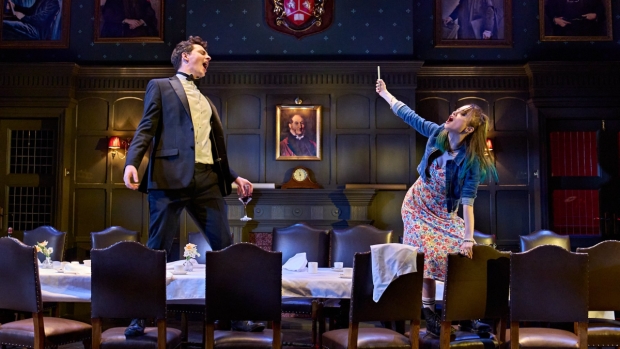Richard Eyre’s ”The Snail House” at the Hampstead Theatre – review

© Manuel Harlan
Legendary director for stage and screen Richard Eyre is a giant among British theatremakers, one who has worked with the greats and earned himself a cabinet’s worth of awards in the process. One of only a handful who can list former artistic director of the National Theatre on their theatrical CV, Eyre has earned acclaim in every sub-genre of cultural entertainment and on both sides of the Atlantic with a career spanning more than half a century. It is striking, then, that despite having penned numerous adaptations, this is Eyre’s first original play.
Hampstead Theatre is host to The Snail House, a play with far less intrigue than its ultimately ambiguous title may suggest. Essentially a classic family drama in an ultra-modern setting, the plot concerns the strained relationship between newly knighted government medical advisor Neil Marriott and his daughter Sarah, whose allegiance to climate change activists extinction rebellion is a point of significant contention. At a party celebrating Marriott’s appointment which largely takes place in another room (offstage), the promise to leave politics unmentioned is clearly too tall an order for the opinionated relatives.
As the skilled performers trade blows, Patrick Walshe McBride’s self-importance earns the lion’s share of the laughs and Amanda Bright’s sincerity cuts through the fog of prejudice. The former is Marriott’s son and a senior political advisor for the conservative party while the latter is a member of the evening’s catering staff whose connection to the medical expert comes as a surprise to his family. In an evening of competitive back and forth, however, it is the marvellous Eva Pope as Marriott’s long-suffering wife Val who emerges the victor, ablaze with unapologetic candour.
For all their squabbling, and there is plenty, each character seems to fall disappointingly short when it comes to articulating their stances, worse too is that so much excellent fodder for debate simply goes unmentioned. The neglect of the health service is scarcely discussed, nor, confoundingly, is the morality of the pandemic in any great detail. Instead, father and daughter take turns regurgitating choruses of “I believe in science” and “carbon emissions are bad”. Even when this altercation melts away to reveal a far more honest exchange about their relationship, we get platitudes in place of progress.
Unsurprisingly, The Snail House is written and directed with unimpeachable skill, the action is so well paced, and the tone so carefully curated that it occasionally appears exciting in spite of a wearying lack of tension and some heavy-handed exposition. To show the methodical laying and clearing of the dining table with little dialogue to cover this is, if nothing else, a triumph of naturalism. The first act establishes its characters richly while the second offers a slightly more inebriated recapitulation of the same ideas, the two taking place before and in the aftermath of the party, respectively.
Regrettably, its stakes simply aren’t high enough, nor is the debate satisfying enough for the play to feel rewarding. Though bold enough to set itself firmly in a post-pandemic Britain and briefly acknowledge the events of the last few years, The Snail House is otherwise outdated in its theatrical scope, presenting nothing that hasn’t been seen before.












